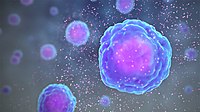
Photo from wikipedia
Predominantly antibody deficiencies (PADs) are inborn disorders characterized by immune dysregulation and increased susceptibility to infections. Response to vaccination, including severe acute respiratory syndrome coronavirus 2 (SARS-CoV-2), may be impaired… Click to show full abstract
Predominantly antibody deficiencies (PADs) are inborn disorders characterized by immune dysregulation and increased susceptibility to infections. Response to vaccination, including severe acute respiratory syndrome coronavirus 2 (SARS-CoV-2), may be impaired in these patients, and studies on responsiveness correlates, including cytokine signatures to antigen stimulation, are sparse. In this study, we aimed to describe the spike-specific cytokine response following whole-blood stimulation with SARS-CoV-2 spike peptides in patients with PAD (n = 16 with common variable immunodeficiency and n = 15 with selective IgA deficiency) and its relationship with the occurrence of coronavirus disease 2019 (COVID-19) during up to 10-month follow-up period. Spike-induced antibody and cytokine production was measured using ELISA (anti-spike IgG, IFN-γ) and xMAP technology (interleukin-1β (IL-1β), IL-4, IL-6, IL-10, IL-15, IL-17A, IL-21, TNF-α, TGF-β1). No difference was found in the production of cytokines between patients with PAD and controls. Anti-spike IgG and cytokine levels did not predict contraction of COVID-19. The only cytokine that distinguished between vaccinated and naturally infected unvaccinated PAD patients was IFN-γ (median 0.64 (IQR = 1.08) in vaccinated vs. 0.10 (IQR = 0.28) in unvaccinated). This study describes the spike-specific cytokine response to SARS-CoV-2 antigens, which is not predictive of contracting COVID-19 during the follow-up.
Journal Title: Viruses
Year Published: 2023
Link to full text (if available)
Share on Social Media: Sign Up to like & get
recommendations!